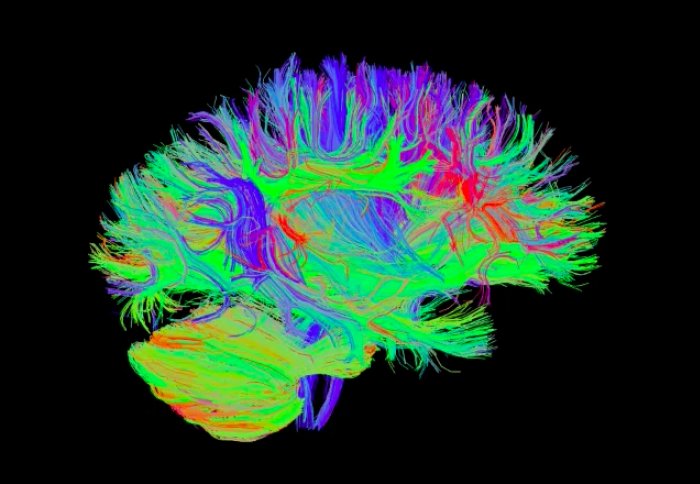Brain injury: Scientist reveals impact of Imperial's research on patients' lives

Diffusion tensor imaging illustrates white matter connections in the brain
Dr Sara De Simoni talks traumatic brain injury, its devastating after-effects, and the research being done at Imperial to help patients.
-
Traumatic brain injury, or TBI, is a very common condition that can have devastating life-long effects. Here at Imperial, a team of researchers at the Computational, Cognitive and Clinical Neuroimaging Lab (C3NL), pictured below, are working to help sufferers of TBI using a variety of approaches. Imperial's Caroline Brogan spoke to Dr Sara De Simoni, post-doctoral research associate at Imperial’s Department of Medicine, about the work Imperial's TBI research group.

What is TBI and how many people are affected?
Traumatic brain injury, or TBI, is one of the commonest causes of death and disability worldwide in people under 40 years old, but its often devastating effects are only just beginning to be recognised.
TBI is an injury to the brain caused by an external force such as in a car collision. The severity of the injury, ranging from mild to severe, determines the long term effects on the patients.
The World Health Organisation estimates that around 5.3 million people are living with a TBI related disability in the USA, and 7.7 million in the EU. Although some TBIs are mild and do not cause permanent or long term disability, many TBIs can cause significant, long lasting disability.
-
What are the short and long term effects of TBI?
TBI can have devastating effects on health. In the short term, TBI can cause post-traumatic memory loss, or amnesia, where patients have trouble forming new memories and become confused and disorientated. This can last anywhere from an hour to several weeks.
Longer term effects are very common after TBI, particularly in those with moderate to severe injuries. These are wide-ranging and can be devastating. Cognitive problems such as difficulty thinking, memory problems, and trouble concentrating can lead to loss of employment and homelessness. Mental health problems, such as depression, can result in relationship breakdown. Many other problems can severely affect quality of life, such as disrupted sleep, hormonal problems and epilepsy.
These problems are not always obvious because they are not easily seen, so TBI can be considered a ‘hidden disability’. Researchers and clinicians in this area can therefore be powerful advocates for this patient population.
-
How is TBI caused, and who is at highest risk?
The top 3 causes of TBI in the UK are road traffic accidents, falls and assaults. Older teenagers (ages 15 to 19 years), older adults (ages 65 years and older), and males across all age groups are most likely to sustain a TBI. Selected populations, such as the military and contact sports players have a higher risk of sustaining TBIs.
-
What is your research team doing to treat TBI?
Problems caused by TBI are not always obvious because they are not easily seen, so TBI can be considered a ‘hidden disability’. Researchers and clinicians in this area can therefore be powerful advocates for this patient population.
– Dr De Simoni
Department of Medicine
Imperial's TBI research group is taking a multi-faceted approach to TBI research. The studies range from trying to identify preventative measures, such as improving helmet design, to tracking recovery following a TBI. Intervention studies are also a major focus. For example, at Imperial College, we are testing the effectiveness of methylphenidate, or Ritalin, to help those suffering with TBI-related disorders. Methylphenidate is currently used to treat ADHD, but might be effective in improving cognitive function after TBI. However, the response to treatment can be highly variable between patients. Therefore, what is needed in the clinic is a way to target the use of these drugs to patients who are likely to respond. The use of functional brain imaging prior to using methylphenidate, may help us identify the patients who will benefit from this treatment.
-
What preventative measures can be taken to lower the risk of TBI and its effects?
Seat belt and helmet use can both reduce the risk of sustaining a TBI and decrease its severity if it occurs, as well as using relevant safety equipment in high-risk situations. However, we must recognise that injuries are an inevitable part of life. Rapid, effective emergency treatment can help reduce the risk of developing serious long-term effects after a TBI. Targeted, evidence-based rehabilitation strategies must also be available so that people with TBIs are not lost once they leave hospital.
-
What more needs to be done to help those suffering with the long term effects of TBI?
For a long time, TBI has been a neglected research area. An important goal for us is to understand the factors which contribute to why there is such a range in how people do after TBI. This involves research studies which track recovery over time, starting with the injury and following people up over years. Additionally, because TBI can affect anyone and can take many forms, it is important for these studies to recruit large numbers in order to account for this. These large, comprehensive and long-term studies require huge amounts of manpower and funding. However, given the huge personal, societal and financial cost of TBI, these studies represent an important investment.
For more information and help regarding traumatic brain injury, visit:
Headway: The UK-wide charity that works to improve life after brain injury.
TBI TALK: A resource for patients, carers and others to learn about TBI research from around the world.
Article text (excluding photos or graphics) © Imperial College London.
Photos and graphics subject to third party copyright used with permission or © Imperial College London.
Reporter
Caroline Brogan
Communications Division